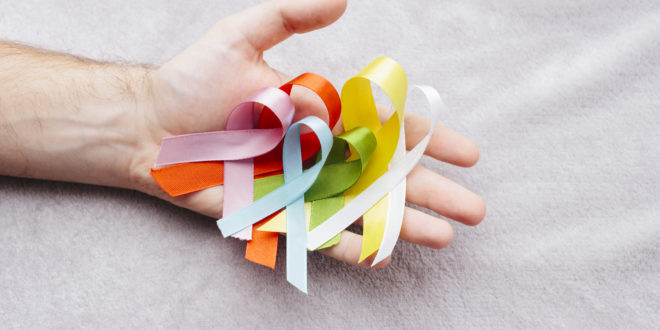by Michelle Sutton-Kerchner
You won the fight of your life. Now what …
June is National Cancer Survivors Month. It is a time for survivors and fighters to reflect on their journey and be praised. These brave warriors are growing in size, thanks to research and evolving treatment options. Individuals are living longer lives after cancer diagnosis, many well into later years.
Statistics reflect the need for a forward-thinking approach toward post-treatment care. There are pivotal times during one’s battle and recovery. The care we receive can be the crucial difference between simply surviving and flourishing.
Mixed Emotions
Surviving the physical and mental anguish of cancer treatment is a relief. It is something to celebrate as one attempts a return to normal life. However, this much-anticipated life-after-treatment may not come as easily as expected. As you graduate from your medical team’s protective care, it is normal to feel a mix of emotions.
 After cancer treatment, many feel they are left with a battlefield. Your body and mind need to continue recovering. It is time to rebuild, heal, and grow. Life, which was put on hold, has come back to the forefront with all its responsibilities and demands. It is common to feel grief, sadness, overwhelmed, happy, grateful, and angry—sometimes simultaneously.
After cancer treatment, many feel they are left with a battlefield. Your body and mind need to continue recovering. It is time to rebuild, heal, and grow. Life, which was put on hold, has come back to the forefront with all its responsibilities and demands. It is common to feel grief, sadness, overwhelmed, happy, grateful, and angry—sometimes simultaneously.
Until now, the focus was purely on survival, of both the treatment and cancer itself. Steps were well-planned by professionals. During treatment, focus is on the physical. Post-treatment is often when emotions finally can be processed.
Succeeding Through the Aftermath
Survivor and member Carol Quick underwent seven months of chemotherapy, one month of radiation, and a bout of anemia. She was left to struggle with neuropathy, poor posture, and balance issues.
“I was out of shape and depressed,” Carol admits. She turned to the Center’s Cancer Wellness Program for support with her next phase in life. Through compassionate care and camaraderie, Carol realized she was not alone. Her confidence and spirits increased, along with her strength.
“The Program’s exercises are gentle yet challenging. Throughout, we are encouraged to listen to our bodies and do our own personal best,” she informs. Perhaps most importantly, Carol has benefited from sharing with others. “Those in the Program are supportive and inspiring. We laugh a lot and celebrate each other’s victories.”
Coping Mechanisms
As Carol learned, there is support available after cancer treatment. Through this next phase of recovery, it comes in a variety of forms. Loved ones are usually helpful and mean well. However, often the understanding from someone who has experienced cancer adds another element to your recovery. This shared empathy reduces loneliness and helps ward off depression.
 Fear of the future is natural, even well into remission. Anxiety about cancer returning is legitimate. Pull from the deep strength you used to battle this disease. You will need it to be brave when inevitable worries strike.
Fear of the future is natural, even well into remission. Anxiety about cancer returning is legitimate. Pull from the deep strength you used to battle this disease. You will need it to be brave when inevitable worries strike.
- Take control by scheduling follow-up appointments and testing. Show up and ask questions.
- Help your body heal through a healthy diet. A registered dietitian can suggest cancer-fighting foods, many which involve fruits and vegetables.
- Work with a personal trainer to create an appropriate fitness program that will continue to help strengthen your body.
- Rest often. Your body has been through the war of cancer. Try to focus on its amazing strength, especially when feeling your weakest. Don’t be afraid to ask for help.
- Return to activities you enjoy first. The backlog of house chores and paused career initiatives can wait.
Survivor and Cancer Wellness Program participant Marilyn Goodman, a 72-year-old grandmother with stage 4 lung cancer, finds exercise an important part of the healing process. She has survived chemotherapy, two years of an immunology trial, removal of her lower right lung, removal of her upper left lung, and radiation. “My oncologist, surgeon, and radiologist all concluded my work at the Center helped prepare me for this journey,” informs Marilyn.
Marilyn recommends appropriately increasing activity level when recovering. “Surviving is about knowing when to push farther and when to take a moment,” shares Marilyn who learned the value of this approach from her Cancer Wellness Program trainer, Paulette.
Everyone has unique coping techniques. Marilyn emphasizes the importance of keeping a positive attitude throughout, regardless of which mechanisms and exercises you try.
Be Empowered
 Own your journey, but do not let cancer define you. Acknowledge your scars but help them fade. Let your new, authentic self emerge, the one who battles cancer. You are a survivor.
Own your journey, but do not let cancer define you. Acknowledge your scars but help them fade. Let your new, authentic self emerge, the one who battles cancer. You are a survivor.
Sources
American Cancer Society
Livestrong.org
Mayoclinic.org
National Cancer Institute
 Fitness & Wellness News Your Source for Fitness News, Wellness News, Health News, and Nutrition News!
Fitness & Wellness News Your Source for Fitness News, Wellness News, Health News, and Nutrition News!





One comment
Pingback: Have Won The Battle of Cancer. Now What? – Your Resource Connection